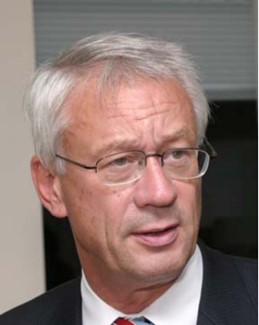【百家大讲堂】第177期:为什么密集天线阵的限制对稀疏天线阵有利
来源: 发布日期:2019-03-28
【百家大讲堂】第177期:为什么密集天线阵的限制对稀疏天线阵有利
讲座题目:为什么密集天线阵的限制对稀疏天线阵有利
报 告 人:Prof. Dr. Leo P. Ligthart
时 间:2019年3月28日下午14:00-16:30
地 点:10号教学楼501
主办单位:研究生院、信息与电子学院
报名方式:登录必赢在线注册,(中国)科技公司微信企业号---第二课堂---课程报名中选择“【百家大讲堂】第177期:为什么密集天线阵的限制对稀疏天线阵有利”
【主讲人简介】

自1994年起,L.P. lithart是代尔夫特理工大学电气工程数学和计算机科学学院(EEMCS)电信任务和雷达国际研究中心(IRCTR)的主任。在他的领导下,IRCTR的研究活动集中在以下具体领域:天线和传播、雷达技术、电信传输和微波遥感。
在荷兰技术基金会(STW)和国家和国际研究所的支持下,各组织和工业IRCTR开始与前苏联的研究小组合作开展项目,将这些研究小组的知识纳入IRCTR的偏振雷达遥感和探地雷达方面。L.P. lithart获得莫斯科国立民航技术大学荣誉博士学位,以表彰他对FSU国家雷达技术知识融合的贡献。他获得了托木斯克国立控制系统和放射电子学大学的荣誉博士学位,以表彰他为使该大学的研究达到国际水平所作的贡献。
Lithart教授负责这座近100米高的教学大楼楼顶上出色的雷达设备。根据Lithart教授的要求,在一间有条件的房间内安装了一套新型的高科技毫米波设备。高达110 GHz的AB-mm系统和HP系统的测试表明,IRCTR已经准备好进入mm-wave领域。
Since 1994 Prof. dr. ir. L.P. Ligthart was director of the International Research Centre for TelecommunicationsTransmission and Radar (IRCTR) as part of the Faculty of Electrical Engineering Mathematics and Computer Science (EEMCS) of the Technical University of Delft. Under his directorship, IRCTR focused its research activities into the specific areas of: antennas and propagation, radar technology, telecommunications transmission and microwave remote sensing.
With support from the Netherlands Technology Foundation (STW) and national and international institutes, organisations and industries IRCTR started projects with research groups in the Former Soviet Union (FSU) to incorporate knowledge of those research groups into IRCTR on Polarimetric Radar Remote Sensing and on Ground Penetrating Radar. Prof. dr. ir. L.P. Ligthart received an Honorary Doctorate from the Moscow State Technical University of Civil Aviation for his contribution to knowledge fusion on radar technology from the FSU countries with existing knowledge in Western countries. He received an Honorary Doctorate from the Tomsk State University of Control Systems and Radioelectronics for his contribution to bring the research at that university at an international level.
Prof. Ligthart has been responsible for the outstanding radar facilities on the roof of the almost 100 m tall Faculty building. Based on the request of Prof. Ligthart a new high-tech mm-wave facility was granted and installed inside a conditioned room. Tests up to 110 GHz of the AB-mm system and the HP system have shown that IRCTR is well prepared to step into the mm-wave arena.
【讲座信息】
在现代无线电和雷达中,天线阵在满足空间和频域要求方面发挥着重要的多功能作用。大多数文献中存在所谓的“密集”阵列,其天线单元之间的间距相等,波长为一半。在为广角扫描和高角分辨率而设计的密集阵中,需要大量具有独立收发模块的单元,这意味着高增益密集阵天线的成本较高。元素间的相互耦合和广角扫描要求降低了宽带密集阵列的性能,给一代又一代的天线工程师带来了许多头痛的问题。
在讲座中,密集阵列的局限性引起了人们的注意。
在所谓的“稀疏”数组中,元素之间的间距更大。稀疏数组很有趣,因为它们使用“数组细化”,因此潜在的成本更低。在讲座中,一些稀疏阵列的设计展示了什么是稀疏阵列的预期性能。在此基础上,讨论了稀疏阵的一系列应用(自主飞行器、机载干涉传感、近程高分辨率成像、多波束卫星天线),并给出了具体的稀疏阵特性。
In modern radio and radar antenna arrays play an important multi-function role fulfilling demanding requirements in spatial and frequency domain. Most literature exists on so called ‘dense’ arrays with equidistant spacing between the antenna elements in the order of half the wavelength. In dense arrays designed for wide-angular scanning and high angular resolution, a large number of elements with individual transmit-receive modules is needed meaning that high gain dense antenna arrays are costly. Mutual coupling between the elements and wide-angular scanning requirements give degradation in wide band dense array performance and cause many headache problems for generations of antenna engineers.
In the lecture the limitations in dense arrays get attention.
In so called ‘sparse’ arrays the spacing between elements is larger. Sparse arrays are interesting because they use ‘array thinning’ and have therefore a potential lower cost. In the lecture some sparse array designs are presented showing what can be the expected performance of sparse arrays. After this a series of sparse array applications (Autonomous Vehicle, Airborne Interferometric Sensing, Near Range High resolution imaging, multi beam satellite antenna) are discussed, demonstrating specific sparse array characteristics
